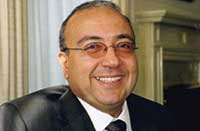
On October 22, Ambassador Abderahman Salaheldin, Egypt’s Assistant Minister of Foreign Affairs, addressed the potential for collaboration between the Arab world and the United States to work for peace in the Middle East in his lecture titled “The Arab World and the United States: Hindering Misconceptions and Untapped Potentials.”
He said, “I think President Obama made a very clear message to the Muslim and the Arab world when he chose Cairo” to convey his desire to repair relations damaged during the previous eight years. “The very important part of the message that still remains with all who were in the room at the time, is the part about the U.S. intention to act, and to engage fully, the parties of the Arab-Israeli conflict in order to end that conflict.” Ambassador Salaheldin said the Arab-Israeli conflict has been overshadowed by many other concerns in that part of the world, including the wars in Iraq and Afghanistan and concern about Iran’s nuclear ambitions. “To have peace in the Middle East come back to the forefront of the new president’s agenda is something very important, not only to our part of the world, but beyond, to the whole Muslim world, and it also has its impact on the rest of the world,” he said.
He described the successful negotiations between Egypt and Israel in 1977. “Sadat and Begin ended up concluding a political settlement – a peace treaty – where Israelis withdrew from the land they occupied in 1967. Also, they dismantled the settlements they built in Sinai. They gave back the oil fields that they occupied in Sinai. And they got full peace, full diplomatic relations. They also got security, permanent security.” The treaty has held for more than 30 years.
He said the Egyptian experience illustrates the importance of U.S. involvement, rather than leaving the parties in the Middle East to their own efforts. “If it were not for the United States, we would not have been able to produce an agreement with Israel. If it were not for the personal and continuous involvement of the American president at the time, Jimmy Carter, it would not have been possible for Egypt and Israel to conclude that agreement. The United States not only provided mediation, but put pressure on both sides.” Ambassador Salaheldin said he believes the same approach could work with Palestine, Syria, and Lebanon to reach a peace agreement with Israel, and that peace between Israel and all Arab countries could follow.
Referring to Israel’s demand that “natural growth” of settlements in the West Bank be allowed, Ambassador Salaheldin said, “There is nothing natural about making peace impossible. With each settlement building that’s put in the Occupied Territories, the possibility of establishing an independent, viable, and contiguous Palestinian state is diminishing. So we are shooting ourselves in the foot, only because we are trying to accommodate a few radicals, who would like, for political reasons – using religion – to do that. By the same token, we should not allow any attack on Israelis.”
He concluded by saying he hoped Americans would stand behind Obama in his quest to reach a settlement with Israelis and Palestinians. “For him to take an active role in engaging those parties is not really siding with one side or another. For the U.S. to weigh in, and put pressures, and give incentives to the parties to produce an agreement is something we should all work for.” Ambassador Salaheldin’s lecture was sponsored by the Office of International Affairs, the Council on Middle East Studies, and the MacMillan Center.
